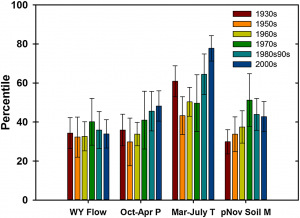Connie Woodhouse at the University of Arizona and colleagues have a new paper presenting the most direct link yet between a greenhouse-warmed climate and reduced flows in the Colorado River.

Comparison of hydroclimatic variables (Colorado River at Lees Ferry water year streamflow, October–April total precipitation, March–July average temperature, and prior November soil moisture) averaged for the years in each of six droughts in the upper Colorado River basin, percentile values with standard errors. Woodhouse et al
Modeling has for many years projected such an effect in the future, but the new Woodhouse et al. paper (Increasing influence of air temperature on upper Colorado River streamflow, GRL, I believe it is ungated) is the first direct published measurement I’m aware of suggesting that it is already underway:
An important finding revealed by this work is the clustering over the last two decades of anomalous years in which already low flows are lower than might be anticipated given cool season precipitation totals. Drought conditions have persisted over the past 15?years in the upper Colorado River basin, negating any substantive positive effect of a handful of wet years (2005, 2008, and 2011) within this interval of time. In most recent drought years, low flows have been further exacerbated by warm temperatures. (emphasis added)
Woodhouse and her colleagues looked at a range of influences in annual flow on the river, including how much precipitation fallows, soil moisture in the preceding season, and spring-summer temperatures. They found that the drought of the 21st century was actually the wettest of the droughts in the historic record, as measured by the amount of precipitation falling across the Upper Colorado River Basin. But the extraordinary temperatures (it has been by far the warmest drought) pushed down the river’s flow.
This is scientifically unsurprising. When it’s warmer, plants transpire more water, and evaporation is greater. But there’s some subtle statistical analysis in the new Woodhouse et al. paper that goes beyond this obvious point to tease out the relationship between precipitation, temperature, and antecedent soil moisture. (One of the surprises to me was the relatively small impact of soil moisture going into the winter. I’d have expected the effect to be larger.)
Worth noting: the forecast this year is for a warm spring.

Pingback: Climate change is already sapping the Colorado River - jfleck at inkstain